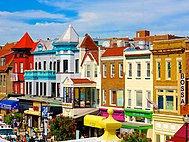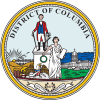Washington, D.C. | |
|---|---|
| District of Columbia | |
| Nickname(s): D.C., The District | |
| Motto(s): Justitia Omnibus (English: Justice for All) | |
| Anthem: "Washington"[1] | |
 Interactive map of Washington, D.C. | |
 Neighborhoods of Washington, D.C. | |
| Coordinates: 38°54′17″N 77°00′59″W / 38.90472°N 77.01639°W | |
| Country | United States |
| Residence Act | July 16, 1790 |
| Organized | February 27, 1801 |
| Consolidated | February 21, 1871 |
| Home Rule Act | December 24, 1973 |
| Named for | |
| Government | |
| • Type | Mayor–council |
| • Mayor | Muriel Bowser (D) |
| • D.C. Council |
|
| • U.S. House | Eleanor Holmes Norton (D), Delegate (At-large) |
| Area | |
• Federal capital city and district | 68.35 sq mi (177.0 km2) |
| • Land | 61.126 sq mi (158.32 km2) |
| • Water | 7.224 sq mi (18.71 km2) |
| Highest elevation | 409 ft (125 m) |
| Lowest elevation | 0 ft (0 m) |
| Population | |
• Federal capital city and district | 689,545 |
• Estimate (2023)[4] | 678,972 |
| • Rank | 64th in North America 23rd in the United States |
| • Density | 11,280.71/sq mi (4,355.39/km2) |
| • Urban | 5,174,759 (US: 8th) |
| • Urban density | 3,997.5/sq mi (1,543.4/km2) |
| • Metro | 6,304,975 (US: 7th) |
| Demonym | Washingtonian[7] |
| GDP | |
| • Federal capital city and district | $174.8 billion (2023) |
| • Metro | $660.6 billion (2022) |
| Time zone | UTC−05:00 (Eastern Time) |
| • Summer (DST) | UTC−04:00 (Eastern Daylight Time) |
| ZIP Codes | 20001–20098, 20201–20599, 56901–56999 |
| Area code(s) | 202 and 771[10][11] |
| ISO 3166 code | US-DC |
| Airports | |
| Railroads | |
| Website | dc |
Washington, D.C., formally the District of Columbia and commonly known as Washington or D.C., is the capital city and federal district of the United States. The city is on the Potomac River, across from Virginia, and shares land borders with Maryland to its north and east. It was named after George Washington, the first president of the United States. The district is named after Columbia, the female personification of the nation.
The U.S. Constitution in 1789 called for the creation of a federal district under the exclusive jurisdiction of the U.S. Congress. As such, Washington, D.C., is not part of any state, and is not one itself. The Residence Act, adopted on July 16, 1790, approved the creation of the capital district along the Potomac River. The city was founded in 1791, and the 6th Congress held the first session in the unfinished Capitol Building in 1800 after the capital moved from Philadelphia. In 1801, the District of Columbia, formerly part of Maryland and Virginia and including the existing settlements of Georgetown and Alexandria, was officially recognized as the federal district; initially, the city was a separate settlement within the larger district. In 1846, Congress returned the land originally ceded by Virginia, including the city of Alexandria. In 1871, it created a single municipality for the remaining portion of the district. There have been several unsuccessful efforts to make the district into a state since the 1880s; a statehood bill passed the House of Representatives in 2021 but was not adopted by the U.S. Senate. To become law it would have to be passed by the Senate and signed by president; it would have renamed the city Washington, Douglas Commonwealth and shrunk the Federal District to about the size of the national mall.
Designed in 1791 by Pierre Charles L'Enfant, the city is divided into quadrants, which are centered around the Capitol Building and include 131 neighborhoods. As of the 2020 census, the city had a population of 689,545.[3] Commuters from the city's Maryland and Virginia suburbs raise the city's daytime population to more than one million during the workweek.[12] The Washington metropolitan area, which includes parts of Maryland, Virginia, and West Virginia, is the country's seventh-largest metropolitan area, with a 2023 population of 6.3 million residents.[6] A locally elected mayor and 13-member council have governed the district since 1973, though Congress retains the power to overturn local laws. Washington, D.C., residents are, on the federal level, politically disenfranchised since the city's residents do not have voting representation in Congress; the city's residents elect a single non-voting congressional delegate to the U.S. House of Representatives. The city's voters choose three presidential electors in accordance with the Twenty-third Amendment, passed in 1961.
Washington, D.C. anchors the southern end of the Northeast megalopolis. As the seat of the U.S. federal government, the city is an important world political capital.[13] The city hosts the buildings that house federal government headquarters, including the White House, the Capitol, the Supreme Court Building, and multiple federal departments and agencies. The city is home to many national monuments and museums, located most prominently on or around the National Mall, including the Jefferson Memorial, the Lincoln Memorial, and the Washington Monument. It hosts 177 foreign embassies and serves as the headquarters for the World Bank, the International Monetary Fund, the Organization of American States, and other international organizations. Home to many of the nation's largest industry associations, non-profit organizations, and think tanks, D.C. is known as a lobbying hub, with K Street as the industry center.[14] The city had 20.7 million domestic visitors[15] and 1.2 million international visitors, ranking seventh among U.S. cities as of 2022.[16]
- ^ Wysong, Lori (July 15, 2019). "Why You've Probably Never Heard Washington's "Official" Song". Boundary Stones. WETA. Retrieved August 29, 2024.
- ^ Councilmembers Archived March 20, 2023, at the Wayback Machine, Washington, D.C. Accessed March 20, 2023. "Thirteen Members make up the Council: a representative elected from each of the eight wards; and five members, including the Chairman, elected at-large."
- ^ a b "QuickFacts: Washington city, District of Columbia". United States Census Bureau. Archived from the original on January 28, 2023. Retrieved January 21, 2023.
- ^ "Annual Estimates of the Resident Population for Counties in District of Columbia: April 1, 2020 to July 1, 2023 (CO-EST2023-POP-11)". United States Census Bureau. Archived from the original on March 18, 2024. Retrieved March 19, 2024.
- ^ "List of 2020 Census Urban Areas". census.gov. United States Census Bureau. Archived from the original on January 14, 2023. Retrieved January 8, 2023.
- ^ a b "Annual Estimates of the Resident Population for Metropolitan Statistical Areas in the United States and Puerto Rico: April 1, 2020 to July 1, 2023 (CBSA-MET-EST2023-POP)". United States Census Bureau. Archived from the original on March 14, 2024. Retrieved March 19, 2024.
- ^ Brunner, Rob (April 4, 2023). "Who Should Be Called a 'Washingtonian'?". Washingtonian. Retrieved August 29, 2024.
- ^ "Gross Domestic Product: All Industry Total in the District of Columbia". fred.stlouisfed.org.
- ^ "Total Gross Domestic Product for Washington-Arlington-Alexandria, DC-VA-MD-WV (MSA)". fred.stlouisfed.org. Archived from the original on November 13, 2023. Retrieved January 3, 2024.
- ^ D.C.'s New (771) Area Code Will Start Being Assigned In November Archived April 26, 2021, at the Wayback Machine(Retrieved April 26, 2021, from DCist.com)
- ^ 771 will be new D.C. area code, supplementing venerable 202 Archived November 29, 2020, at the Wayback Machine(Retrieved April 26, 2021, from Washington Post)
- ^ "Washington-Arlington-Alexandria, DC-VA-MD-WV". U.S. Census Bureau. U.S. Department of Commerce. Archived from the original on April 19, 2012. Retrieved April 12, 2017.
- ^ Broder, David S. (February 18, 1990). "Nation's Capital in Eclipse as Pride and Power Slip Away". The Washington Post. ProQuest 307230206. Archived from the original on August 10, 2015. Retrieved October 18, 2010.
In the days of the Truman Doctrine, the Marshall Plan and the creation of NATO, [Clark Clifford] said, we saved the world, and Washington became the capital of the world.
- ^ Zak, Dan (May 19, 2023). "K Street: The route of all evil, or just the main drag?". Washington Post. ISSN 0190-8286. Retrieved May 2, 2024.
- ^ "Washington, DC Visitor Research". washington.org. Archived from the original on November 8, 2023. Retrieved December 24, 2023.
- ^ "America's 10 most visited cities" Archived June 14, 2023, at the Wayback Machine, World Atlas, November 6, 2023










